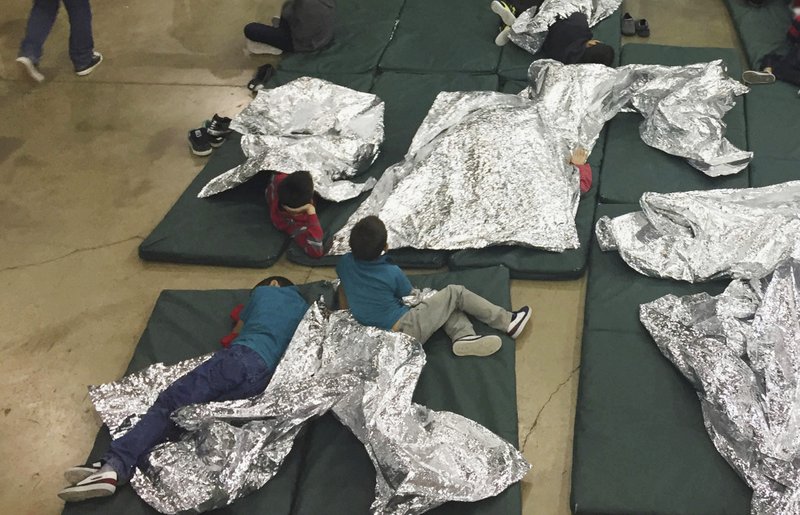MCALLEN, Texas-- Politicians and advocates flocked to the Mexican border to visit U.S. immigration detention centers and turn up the pressure on the Trump administration amid a growing uproar Monday over its policy of separating immigrant children from their parents.
A group of congressional lawmakers on Sunday visited an old warehouse in South Texas where hundreds of children are being held in cages created by metal fencing. One cage held 20 youngsters.
"Those kids inside who have been separated from their parents are already being traumatized," said Democratic Sen. Jeff Merkley of Oregon. "It doesn't matter whether the floor is swept and the bedsheets tucked in tight."
Nearly 2,000 children were taken from their parents over a six-week period in April and May after Attorney General Jeff Sessions announced a "zero tolerance" policy when it comes to prosecuting those arrested for illegally entering the country. Church groups and human rights advocates have sharply criticized the policy, calling it inhumane.
The policy has divided Republicans, with former first lady Laura Bush saying in a guest column in Sunday's Washington Post that the practice of separating immigrant parents and children along the nation's southern border is "cruel" and ?immoral" and "breaks my heart." Bush likened the policy to the internment of Japanese-Americans during World War II.
Massachusetts Gov. Charlie Baker cited the administration's "cruel and inhuman" policy separating children from their parents in reversing a decision to send a National Guard helicopter from his state to the Mexican border. Migrant advocates announced they would rally outside the federal courthouse in Phoenix on Monday afternoon to protest the policy.
President Donald Trump emphatically defended his administration's policy Monday, again falsely blaming Democrats.
"The United States will not be a migrant camp and it will not be a refugee holding facility," he declared. "Not on my watch."
In San Diego, Rep. Juan Vargas and the Congressional Hispanic Caucus were leading members of Congress on a visit Monday to several immigration detention facilities. Vargas, Democratic Leader Nancy Pelosi and other U.S. lawmakers hoped to meet with men, women and children detained at the international boundary.
Inside the South Texas warehouse, hundreds of immigration children waited inside chain-link enclosures. Scattered about were bottles of water, bags of chips and blankets that looked like large sheets of metal foil.
It was the same facility the U.S. Border Patrol allowed reporters to briefly visit on Sunday. Agents did not allow reporters to interview detainees or take photos.
More than 1,100 people were inside the large, dark facility, which is divided into separate wings for unaccompanied children, adults on their own, and mothers and fathers with children. The cages in each wing open out into common areas so that detainees can use portable restrooms. The overhead lighting in the warehouse stays on around the clock.
At the federal courthouse in McAllen on Monday, some among the estimated 80 immigrants preparing to plead guilty on immigration charges asked the judge questions such as, "What's going to happen to my daughter?" and "What will happen to my son?"
Attorneys at the hearings said the immigrants had brought several dozen boys and girls with them to the U.S., and the judge replied that he didn't know what would happen to their children.
Typically, parents are sent to court, while children go to government facilities as the Trump administration carries out the new "zero tolerance" policy. There have been stories of children being torn from their parents' arms and parents not being able to locate their sons and daughters.
In Texas' Rio Grande Valley, the busiest corridor for people trying to enter the U.S., Border Patrol officials argue that they have to crack down on migrants and separate adults from children as a deterrent to others trying to get into the U.S. illegally.
"When you exempt a group of people from the law ... that creates a draw," said Manuel Padilla, the Border Patrol's chief agent here.
National on 06/19/2018